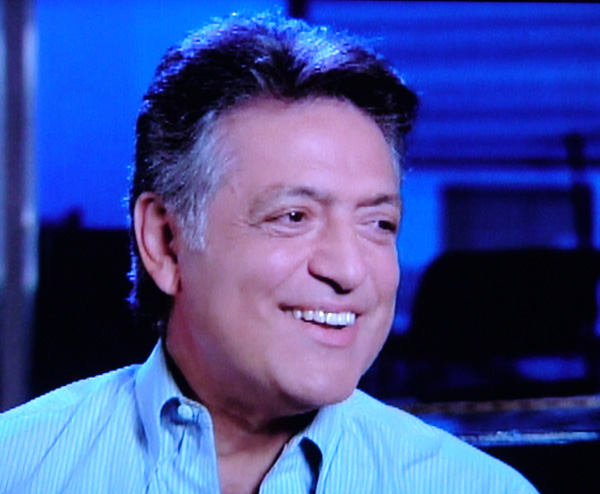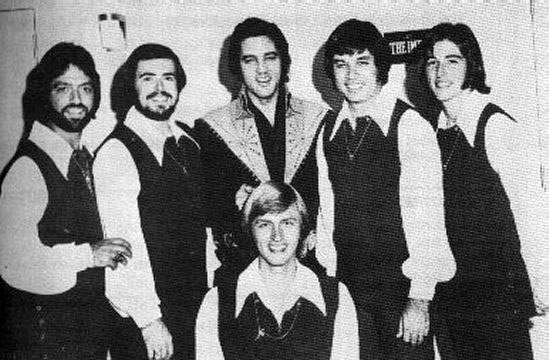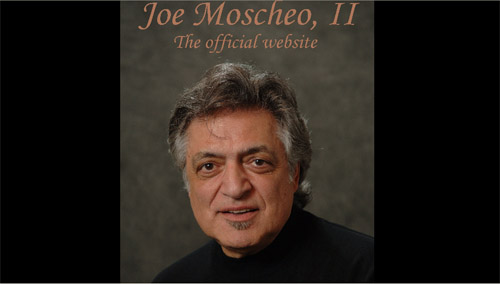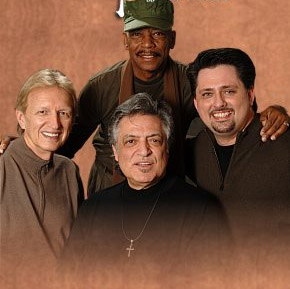


Joe
Moscheo
is one of the original singers of the Imperials, the "multi-award" gospel group
that provided backing for Elvis Presley in some of his greatest gospel
recordings and live appearances between those magical years of 1969-1971.
Joe, who is a recognized artist recently inducted into the Gospel Hall Of
Fame, also co-produced one of the best Elvis documentaries, He Touched Me:
The Gospel Music Of Elvis Presley and recently released the book The Gospel
Side Of Elvis. In this exclusive interview for Elvis Collectors Brasil, Joe
Moscheo talked about his career and his work with Elvis Presley.
Elvis
Collectors Brasil: To start this interview, please tell us about yourself. Where
you were born and how did you got involved with gospel
music.
Joe
Moscheo:
Im from upstate
ECB:
Please, tell us about the background of The Imperials. How the group was
formed?
JM:
In the
Jake
formed this new group, The Imperials, in 1964, and he picked all of us to be in
his group and then he became ill and had to leave the group. When he left the
group, that’s when we went on with Elvis in 1969.
ECB:
The Imperials won many awards since it was formed. Among then,4 Grammy Awards
and 13 Dove awards. What you think that makes the Imperials such a successful
and recognized gospel influence?
JM:
We have been very fortunate that people love our music and our sound. I think
that even today, we are much older, but as a group we have a sound that is very
solid and different. As individuals is not so exciting but as a group, its very
good. It seems that we have been successful in this way. Our arrangements, the
blending of the voices, the way we perform on stage…there are a lot of facts,
but I think that the fact that the group has such an unique sound, and its so
solid as a backing group when we are singing to some other singer, is the most
important one. Elvis used to call us the “wall of sound” behind him. That’s a
very important thing and we are very proud of it. We have many awards because of this and we are
very, very fortunate and thankful for that.
ECB:
Undoubtedly because of the great talent of the group, Elvis wanted them to
perform live with him. How you guys received the invitation to join him in his
upcoming concerts?
JM:
It was in 1969 when we were going to
We
said "yes,
we will do it", and it changed our lives and opened so many doors
for us. Even today we still enjoy some of the benefits from this time with
Elvis. It was a very important time in our careers.
ECB:
What are your recollections of those concerts?
JM:
Oh my God, it hard to even explain. I remember a lot of things. I remember the
rehearsals with Elvis…but the biggest memory is the opening night. Its one thing
to have a rehearsal and to be on stage when you’re just putting the show
together, organizing everything. But an opening night, when the curtain goes out
and all the people are in the audience and you watch the reaction of the
people when Elvis walks on stage...To see how thrilling and important he was…His
image, and his charisma and everything about him was so electrifying that we
were caught up in the same thing. When he walked on stage we were all so
mesmerized by him, that we almost forgot to sing! We were so excited, it was
such a thrill. Every night when he walked on stage and the music started to play
and he looked at us and winked, it was like a dream. It is a wonderful memory
that I will never forget.
ECB:
In 1970, MGM was shooting a documentary of his appearances in Vegas. The
documentary became to be known as Elvis: That´s The Way It Is. How it was like
to be part of the film?
JM:
It was easy for us, but I think it was more difficult to Elvis because there was
a film crew there and they wanted certain things. It was almost like they were
interrupting the show with all the cameras and the way they wanted things. We
did two shows a night, what they call “Dinner Show” and “Midnight Show” and they
had the cameras rolling. When they missed something on the first show they would
get it on the next show and they would ask Elvis to do a certain song or to use
a certain jumpsuit because they needed some more footage of some ones in
special. It was a very exciting time and it was not so difficult for us, but
maybe a little stressful for him. Now that we look at the film and realize what
they were doing, most of the time we didn’t even know that the cameras were on
us. It was a great documentary and it’s great to be a part of that history.
Joe Moscheo rehearsing with The Imperials and The Sweets,
During the shooting of Elvis: Thats The Way It Is
ECB:
In this movie, there is some great footage of the rehearsals for the upcoming
concerts. In these segments, especially during the rehearsal of Bridge Over
Troubled Waters, Elvis appears directing the backup vocalist as to how he wants
a certain passage of the song. How much did he collaborate to the arrangements
of the songs?
JM:
He did that in a lot of songs. He already in his mind knew what he wanted to
hear and sometimes, when he wasn’t hearing what he wanted, he would look over,
motion with his hand, and sing our part the way he wanted to hear it. He wasn’t
educated in music, but he had a wonderful feeling for the music and for the
interpretation of the song. He knew exactly what he wanted to hear. Of course,
we always wanted to please him and do what he wanted us to do, and the results
at the end were always fantastic. The arrangements and the way that he
sings, even if it was done before by other artists, once Elvis would sing the
song, then you forget about the other artists and you only consider that Elvis
sung it and that’s the way it should be.
ECB:
In 1971, you worked with him in the studio in
JM:
The
He Touched Me album was a very
important album for us. The songs that were on that album were songs that we had
previously recorded on an Imperials album. Elvis would listen to our music. He
was a student. He listened, and he learned, he knew everyones voice and all the
arrangements, every part. We would sing these songs with him when we were up in
the suite. So, when it was time for him to record another gospel album, it was
very easy because he knew all the songs. I played the piano on A Thing Called Love. He just loved to
sing with a quartet, he was very comfortable there. He loved these songs, we
loved the rehearsals with him and he wanted to sing as part of our group. We did
all the arrangements for six or seven of those songs. Those were songs of our
album, almost the same thing but with Elvis voice in it. This was very important
for us, a wonderful experience and we had such a great time doing it. He was
familiar with the songs, he loved the music and so the sessions went on very
easy.
Elvis
didn’t have lot o patience in the sessions. If he didn’t liked the song, if it
wasn’t going well with the musicians or if was taking too long, he would lose
interest and would go to something else. But when we did the He Touched Me album, it was very
enjoyable.

Elvis With The Imperials. Joe Moscheo is at the far left. February 1971.
ECB: By that time, he already had made some wonderful gospel records, among then the Grammy Winners albums His Hand In Mine and How Great Thou Art. How the gospel community saw the fact of him singing sacred songs, since he was a Rock And Roll Singer?
JM: I think it was mixed, you know. In the beginning, when Elvis first came on the scene, the churches didn’t like his music, they didn’t like the way he looked, and they though that he had the wrong image for the church people. As a matter of fact, some churches would preach against him. But as his career progressed, and his gospel music came out, they found out that he was very sincere about his gospel music. I think in the end, he is of course a rock singer, the “king of rock and roll”, but I also think that his gospel music was very important.
Now
that all of the churches and all of the Christian people have been raised on
this music, they know how important it is. His songs are from his heart and I
think that because they go from his heart to your heart, it makes his music very
important. So, I think that times have changed.
ECB:
Gospel Music was always a part of his life. He often used it to relax and get
his mind at ease. There are many stories about late night gospel sessions on his
hotel suite after the shows. Do you have many memories of those
occasions?
JM:
Many,
many memories. That probably is one of the most precious memories that we have,
because those were times when he was very relaxed, he was doing something he
enjoyed to do. He was not “Elvis, The Superstar”, he was just “Elvis, The
Friend” and we would stand around with some other friends and we would play the
piano singing gospel music. He never wanted to sing any of his hits or any pop
and rock and roll, he wanted to sing gospel. We would do it and we would sing
one song after another for two or three hours, maybe four hours sometimes. If he
had some of his friends there, he would say to them “Listen,
listen” “Listen to the harmony,
how much you can feel the music”, “Listen how it touches
your heart”. He loved it and those were some of my best memories of
those times.
ECB:
Its no secret that Elvis was a deeply religious person. He often wondered about
the good fortune and talent that God gave him, and often he had long
conversations about those subjects with people that he felt a connection with.
Do you recall having this kind of conversations with him?
JM:
Yes,
there were a lot of those conversations. He was a very curious person. The
religion that his mother taught him was very important to him. But everybody was
bringing him other ideas and other religions to him, to investigate. So we had a
lot of talks about religion and he would always come back to his basic religion,
the one that he was brought up, in the church that his mother taught him.
He
was very humble; he never realized how great he was and how important he was. I
think he new he was a superstar and knew that he had a job to do and that was to
be a superstar. When he walked on stage he was “Elvis, The Superstar”, but when
he came off the stage, to be with his friends, he wanted to be “Elvis Presley,
the boy from
I
liked that so much about him, because he could go from being this regular guy to
the superstar when he walked on stage.
ECB:
How much you think gospel music influenced his singing style and the way that he
sang a song?
JM:
Its
been said many times, that his style was a mixture of gospel and rhythm and
blues. Because he was born in the South, he had all those kind of influences.
He had a lot of influences from the outside, but I think gospel music was very, very, influential. He got a lot of the style and phrasing, a lot of the moves, the way he dressed and the way he combed his hair because of some of the gospel groups. They wore those flashy suits; they had their hair slicked back, you know, it was very influential to him.
But
he brought a new way of doing it; he created a whole style, a whole fashion and
a whole style of music. He owned it. It became his. I think he made it better
than it was.
ECB:
Later, in 1972, the Imperials left Elvis. What
happened?
JM:
There
was a little disagreement with Colonel Parker and his office, because when we
went to work for Elvis, we didn’t ask for too much money, we didn’t want them to
think that we were asking for too much money and then they would say no. Later,
we asked for a raise and for some other things, some benefits, but the Colonel
wouldn’t give it for us. We said to him that if we didn’t get those things, then
next time we have to go to Vegas, we wouldn’t go.
The Colonel didn’t tell Elvis, until Elvis called us one day and said “What’s going on? I understand that you’re not coming to Vegas in January.” I said “No we’re not. We can’t do it anymore”. He was disappointed but he couldn’t do anything about it, because he had an agreement with the Colonel, the Colonel would take care of the ‘business’, and EP would take care of the ’stage, and the music’.
So,
we recommended the Stamps, because they were good friends of ours. It was
between the Stamps and the Oak Ridge Boys. J.D. Sumner wanted to do it, and EP
remembered JD from the Blackwood Brothers, so Elvis took the
Stamps.
ECB:
After the Imperials left, did you and the other guys kept in touch with
Elvis?
JM:
I
kept in touch with him quite a bit. I don’t think the other guys did as much as
I did, but I was good friends with him and Priscilla and the family, and I kept
in touch. He was always very cordial, very kind. I think we remained friends
until the end.
What
was the last time you saw him?
JM:
It
was in
ECB:
Do you remember the day when you heard that he had
died?
JM:
Oh
yes. I was working for a big company, BMI, in
ECB: What do you think about the Elvis after death phenomenon? Isn’t it intriguing how he keeps attracting young people with his songs and how his fan base keeps buying everything with his name on?
JM: There´s a lot of theories about this.
You
know, The Imperials are traveling around the world, doing a lot of events, fan
club events, we do a lot of things with
I
think it’s incredible that his life is still in people’s minds and his music is
all over the world, on the radio, on television, on satellite and movies… In the
hearts of the people, he hasn’t even died; he is alive in their hearts. We are
like his disciples, going out and preaching his gospel wherever we go and I
think this is very important and we are very thankful for this opportunity.
ECB:
You also starred in the “Elvis The Concert” shows. I was there at the Concert of
the 30th Anniversary and it was amazing. What was like to sing again
with him, after 30 years of his passing?
JM:
We
have been doing this for ten years, since the 20th anniversary. The
big screen concert is a lot of fun to be part of, because we love the music, we
love to see him looking so good. Only that we all aged and Elvis stays the same
(laughs). He still so strong and so handsome, his music is so much alive, you
know. It seems that you can’t get enough of it, no matter how many times you
sing these songs, its still new and fresh in our minds. It’s a wonderful
thing.
ECB:
You co-produced the acclaimed Special ‘He Touched Me’: The Gospel Music Of Elvis
Presley. I think we can say that the documentary is the definitive one about his
love for gospel music. Now, you´re releasing a new book, The
Gospel Side Of Elvis.
Does the book work as a complement of the audiovisual
documentary?
JM: Yes, it does. I used the documentary a lot, as a guide line to write the book. I thought it was important to put in writing and give my side of how I felt about it, how I related to all of this, and to express myself, just how important gospel music was to him.
I think that other people, maybe Gordon Stoker of the Jordanaires should have written something, or maybe J.D. if he was alive, but nobody seemed to be interested enough to put it on paper. So I took the opportunity to do that and I’m so happy that I did.
My
book was very important in 2007. It was the best selling ‘Elvis’ book in the
market. It reached a lot of people and I’m very, very thankful. I’m going
to do a book signing tour in

ECB:
The Imperials are back again with You,
JM:
We
have been together for a long time. I have been with Terry since 1970, and
But
the most important thing is that when we are on stage, everything fits. It seems
like that this is the way it was supposed to be. We love to be together and sing
together and the people seem to enjoy it.

The Imperials In Its current formation.
From Left to right: Terry Blackwood, Joe Moscheo, Sherman Andrus (Center top) and Gus Gaches.
Photo Courtesy of www.theimperials.us
ECB:
You were recently inducted to the Gospel Hall Of Fame, how do you feel about
it?
JM: Wow! You know, The Imperials were inducted in the Hall of fame, as a group in 1998. And I have been inducted this past year, an individual, for my contribution to the gospel music industry, because I have been a volunteer and on the board of Gospel Music Association for over 35 years. It was a surprise to me, to be recognized, and it was such an honor.
I
feel like that I had given my life to gospel music, to always be an example and
to try to bring gospel music to as many people around the world as I can. To
finally be recognized by our peers, it’s a wonderful, wonderful thing and I was
totally honored and surprised. I had my whole family with me; it was a wonderful
occasion and Im very happy that they did that for me.
Sometimes
I say that maybe my doctor told them that I’m going to die, so they give me an
award (laughs)
ECB:
To finish this interview, what are you doing now and what are your plans for the
future?
JM:
I’ll
be 71 years old. I’m not an old man, but I feel its time for me to slow down a
little bit. I had a job with a big company, an International company, for the
past six years. But at the end of this year I’ll be retiring from this job…. I’m
going to continue to sing with the Imperials. We are going to travel a lot next
year as we have many, many dates in
I’m writing another book, not about Elvis, and I have some other projects that I’m working on.
I
love to paint, so I’m doing a lot of painting this year and I plan to spend more
time with my family in
The Elvis Collectors Brasil website wants to thank Joe Moscheo for this interview and wish him the best of luck in his future projects.
Taped by Sergio Biston on December 2007
Transcribed By Sergio Biston
Tranlasted To Portuguese Language By Sergio Biston and Luiz Henrique C.Gonçalves.
Home
® 2007 Elvis Collectors
Brasil. O
conteúdo deste site, seus textos e imagens são de exclusividade do mesmo.
Qualquer reprodução do seu conteúdo sem prévia autorização dos proprietários é
proibida e consiste em falta
ética.